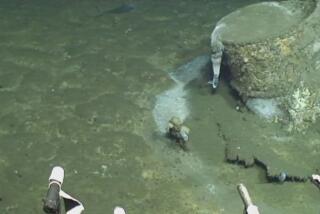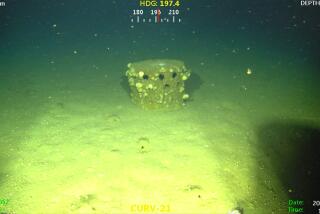U.S. Moves to Block Species Arriving in Ship Ballast
- Share via
In an attempt to reduce the environmental havoc caused by the inadvertent introduction of foreign species, federal authorities today will begin regulating the discharge of ballast water from cargo ships entering all ports in the United States.
The plan, which will be administered by the U.S. Coast Guard, asks vessels traveling international routes to exchange their ballast at least 200 miles from their U.S. destinations.
Although that central element of the policy is not mandatory, captains are required to report to the government whether they exchanged their ballast water before entering port.
They also must submit to random inspections by the Coast Guard, designed to determine how frequently captains comply. If the maritime industry’s performance is poor after 2 1/2 years, the mid-ocean exchange of ballast could become mandatory.
Coast Guard officials say the new policy is a critical step in dealing with foreign marine and freshwater animals that have been causing serious ecological problems at home and abroad.
“This is an easy way of keeping nonnative species from coming into the United States,” said Lt. Cmdr. Joe Lo Sciuto, chief of Coast Guard inspections at the ports of Los Angeles and Long Beach. “We are basically giving industry a chance to police itself.”
Although nonnative species arrive by a variety of means, ballast water is a common way that exotic animals, microorganisms, bacteria and disease organisms can reach domestic ports and waterways.
Ballast water is usually released or taken on in port to balance a cargo ship during loading and unloading. Large vessels carry millions of gallons of ballast, some of it containing life forms.
Once it is released in coastal or inland waters, certain species can create havoc with native aquatic life, fisheries and water systems that supply farms, power plants, industry and metropolitan areas.
In the Great Lakes and the Midwest alone, the fast-reproducing zebra mussel from the Black Sea now causes an estimated $3 billion a year in damage, according to the latest estimates.
At the ports of Los Angeles and Long Beach, surveys have identified at least 46 nonnative species, but harbor officials say those animals have not caused any problems yet.
The most serious problems in California have been reported in the San Francisco Bay Area, where a host of foreign clams and crabs have disrupted food supplies for native species and burrowed into levees. More than 200 exotic species have been identified there.
Ecologists fear that the zebra mussel, which is virtually impossible to eradicate, could easily take hold in the Sacramento-San Joaquin delta, a region tied to the state’s elaborate water distribution network.
“Exotic species are like chemical pollutants that mate,” said Linda Sheehan, a program manager for the Center for Marine Conservation in San Francisco. “Once these critters are here, they spread and you can’t get rid of them.”
The Coast Guard plan, which stems from the National Invasive Species Act of 1996, is the first nationwide attempt to regulate the release of ballast water. The Great Lakes region has had a mandatory program since 1993.
Although ballast water exchange at sea can reduce the risk of introducing invasive species, it has shortcomings. Not all water or sediment bearing foreign organisms is flushed from ballast tanks during the process. Also, ships can be exempted from exchanging ballast for safety reasons, such as rough weather.
Ultimately, Coast Guard officials say the federal government may require some technological solutions, such as the treatment of ballast water before it is released in port.
In Los Angeles and Long Beach, the Coast Guard plans to inspect three of the 100 to 140 ships that arrive every week and fit the criteria for the program.
If shipping lines turn in false ballast water reports, Lo Sciuto said, they will face additional inspections but no penalties.
Information from Coast Guard stations around the nation will be fed into a central database that will help determine the program’s efficacy and whether it should be mandatory.
“Most of the shippers will treat this as a mandatory exchange program,” said Kenny Levin, vice president of the Pacific Merchant Shipping Assn., which represents major shipping companies. “If exchanging ballast water will help, we will do it.”
Critics say the voluntary plan, with its modest inspection component and lack of penalties, will do little to reduce the problem.
“It is pretty weak from our perspective,” said Linda Barr, an aide to Assemblyman Ted Lempert (D-San Carlos). “It really doesn’t help much in getting us to the point where we want to be, which is zero discharge of invasive species.”
Lempert is pushing a bill that would make ballast exchange at sea mandatory for many cargo ships bound for California ports. It also would require technical solutions to purify ballast water where economically feasible.
The bill, stripped of its original deadlines to achieve zero discharge, passed the Assembly earlier this year. It is scheduled for a state Senate hearing July 12.
Lempert’s measure has run into opposition from the shipping industry, which is concerned about permit fees, the costs of meeting zero discharge requirements and the amount of potential penalties. But port and shipping officials say they support mandatory ballast exchange.
Some maritime industry representatives in California say they would have preferred a mandatory national policy to avoid the costly possibility of dealing with both state and federal programs.
The Coast Guard says, however, that if other states pass ballast water laws, it will try to cut down on any duplication that might result.
More to Read
Sign up for Essential California
The most important California stories and recommendations in your inbox every morning.
You may occasionally receive promotional content from the Los Angeles Times.














